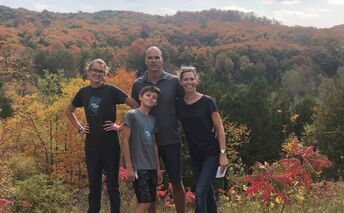|
Lena Scholman  The Scholman Family The Scholman Family A few years ago, my family and I were gathered around a table with refugees from around the world. We ate spicy peanut stew served over rice and passed naan bread to one another as people shared where they were from. We had recently returned from a trip to Bogotá, and the conversation quickly pivoted to “who had traveled through Colombia?” To my surprise, an East African man sitting to my right ruefully smiled and recalled having taken the “scenic route” from Somalia to Brazil, trekking north through the wilderness of South America. Something in his eyes told me this was no Che Guevara Motorcycle Diaries trip across the continent, but a voyage to be endured for the promise of the destination. When I’d explored Colombia, I saw it as a tourist, from behind the windows of a hired car. As we drove through the coffee and banana plantations and I watched the mist lift in the mountain valleys, I thought to myself how much I’d like to get out of the car and explore the rivers and mountains of this wild and beautiful country. Sadly, the frequent military checkpoints in rural areas reminded me that the F.A.R.C. controlled the countryside and it was no place for tourists to go wandering. I could not have imagined that besides activities of the revolutionary armed forces, smugglers led groups of migrants beneath the verdant green canopy of the jungle. How strange that I yearned to hike in that wild land, while on those unknown paths, thousands would have gladly taken my seat in our sightseeing van, safe from mosquitoes, bandits, rain… Here at home, my east Hamilton neighbourhood abuts an ancient indigenous footpath that stretches from Queenston to Tobermory. In minutes I am connected with nature, sheltered in an urban forest, steps from my home. For these past six months, in a world where much is uncertain, the forest has been a sanctuary. I have to wonder how many others have found solace in nature, too. And yet, I also wonder how many would-be asylum seekers are right now literally in the wilderness not by choice. How many people ventured on an uncertain journey knowing there would be periods of time in the wilderness and now find themselves trapped in countries far from home and far from their final destinations? Maybe, like my East African dinner companion, they find themselves sheltering alongside a river in the jungles of Colombia. Maybe the danger they knew they might encounter has become a constant companion. Maybe the mosquitos, bandits and rain have them wondering “how long?” For the past two months, while COVID has closed borders around the world, trapping people in limbo, we’ve challenged ourselves as a family to hike two hundred kilometres in the Ride for Refuge, to raise money for Open Homes Hamilton, a program of IAFR Canada. This multi-church network supports refugee claimants by offering home-based hospitality. As we hiked, and breathed in the fresh, crisp air of a Canadian autumn, I prayed that those walking through other wildernesses, maybe hostile ones, would someday have the opportunity to find refuge here. I prayed they would someday be able to walk a footpath that meanders, without the burden of their meager belongings weighing them down. I prayed that their lives would settle, and they would gain a new appreciation of the natural world, even grow to love and protect it as their families put down roots in a new land. For the men and women at that table years ago, I hope that after crisscrossing oceans and rainforests, continents and borders, they can find refuge in nature as they’ve found refuge in Canada. God Bless.
0 Comments
Your comment will be posted after it is approved.
Leave a Reply. |
WELCOME!
Our vision is to help people survive and recover from forced displacement. We do this together with the church, both globally, and locally in Canada. Archives
May 2024
Categories |
ABOUT IAFR.CA |
OPPORTUNITIES |
AFFILIATES
|
CONTACTIAFR Canada
374 Sheppard Ave E Toronto, ON M2N 3B6 [email protected] Please Note: IAFR Canada does not sponsor people to resettle in Canada. You may want to contact one of Canada's sponsorship agreement holders. |
|
*IAFR Canada is a distinct organization from IAFR USA
All photos on this website are by IAFR unless otherwise noted |
© 2020 International Association For Refugees Canada

 RSS Feed
RSS Feed